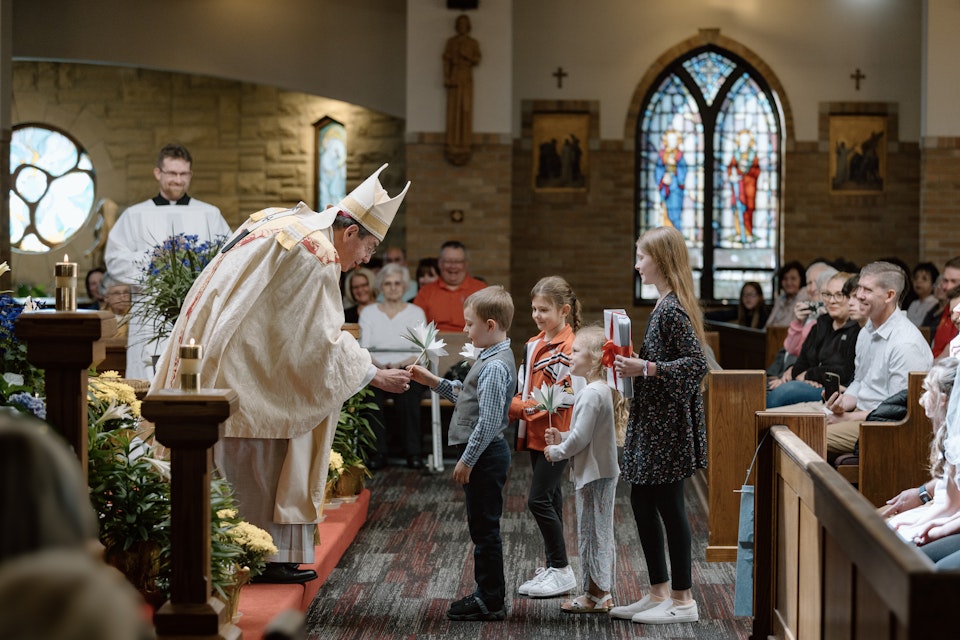ROYAL OAK — On a day when seven men and women were canonized in Rome as saints of the Catholic Church, local congregants met at the National Shrine of the Little Flower Basilica in Royal Oak to celebrate the life and witness of a now-sainted archbishop.
Detroit Auxiliary Bishop Arturo Cepeda celebrated at Mass at the Shrine in honor or St. Oscar Romero, the martyred archbishop of San Salvador, El Salvador, who spoke out for the poor and persecuted in the face of a brutal military dictatorship.
During his homily, Bishop Cepeda said St. Oscar Romero is an example to all of what it means to have an encounter with Jesus Christ as a radical, life-altering moment in which a person decides to give everything to God.
“Only in an encounter with our Lord do we leave behind our possessions and follow Him,” Bishop Cepeda said. “Archbishop Romero showed us the way to be a saint, to be transformed in the way that leads to eternal life.”
Earlier in the day in Rome, Pope Francis canonized Pope Paul VI, who led the last sessions of the Second Vatican Council, setting the Church on the course of the new evangelization.
Pope Francis also canonized Vincenzo Romano, an Italian priest who died in 1831; Nazaria Ignacia March Mesa, a Spanish nun who ministered in Mexico and Bolivia and died in 1943; Catherine Kasper, the 19th-century German founder of the Poor Handmaids of Jesus Christ; Francesco Spinelli, a 19th-century priest and founder of the Sisters Adorers of the Blessed Sacrament; and Nunzio Sulprizio, a layman who died in Naples in 1836, at age 19.
"All these saints, in different contexts," put the Gospel "into practice in their lives, without lukewarmness, without calculation, with the passion to risk everything and to leave it all behind," Pope Francis said in his homily in St. Peter’s Square.

At Shrine, Bishop Cepeda said these saints’ lives are testimonies that God’s word is still alive and plays a part in today’s world.
“The word of God is living and active, sharper than a sword,” Bishop Cepeda said. “It touches our lives, transforms our lives. Jesus, the living word of God, speaks to us through these men and women. (Our devotion) is not just to some principles or accounts or deeds from long ago; these men and women are living testimonies to God now in our lives.”
The Royal Oak basilica was adorned with banners depicting St. Romero and flags of El Salvador. Born in 1917, St. Romero was ordained a priest in 1942 and became an auxiliary bishop of San Salvador in 1970. He was later named bishop of Santiago de Maria in 1974 and then archbishop of San Salvador in 1977.
During his ministry, Archbishop Romero spoke out for the rights of the poor and the oppressed, who were persecuted by the Revolutionary Government of Junta, whose paramilitary right-wing militias terrorized the Church and brutally murdered some of Archbishop Romero’s closest friends.
On March 24, 1980, Archbishop Romero was gunned downed by an assassin after celebrating Mass at a hospital chapel. Many suspect the assassin was hired by the El Salvador government, but charges were never formally made.
Bishop Cepeda quoted one of Archbishop Romero’s final homilies, given on March 23, 1980, given after reports of the deaths and disappearances of many in the Church.
“In his last homily, Oscar Romero said, ‘I would like to make a spiritual claim of the Church, defender of the rights of God: We can’t remain silent in the face of such an abomination,’” Bishop Cepeda said. “He continued, ‘In the face of so much suffering, I implore, I beg you, I order you: In the name of God, stop the oppression.’ Only in an encounter with our Lord do we have the strength to leave our possessions behind and become followers of Christ.”
News of St. Oscar Romero’s canonization was met with great joy for the people of El Salvador, who are celebrating the country’s first saint.
“Oscar Romero’s canonization means the world to me, and the people of El Salvador,” said Richard Martinez, music minister at the National Shrine of the Little Flower Basilica and a native of San Miguel, El Salvador. “Archbishop Romero sacrificed for the poor; he lived for the poor. And he lived for justice and for the people. His lesson was to follow the Gospel, and he showed us how to follow the Gospel. If we listen to the Gospel, we know we are called to act and to care for each other.”

For the Hispanic community at-large, St. Romero’s canonization was celebrated as a time to recognize a servant of God who put the needs of others before himself and showed how the Church can stand in solidarity with the poor and marginalized, lessons that are still relevant today, according to Shrine parishioner Mireya Hernandez.
“Even though I’m not from El Salvador, I love the things he was about, the compassion he had for the poorest people, and all the love he had to share in difficult times,” Hernandez said. “He spoke out for the people who couldn’t speak, was the voice for the voiceless, the people who didn’t have the faculties or the power to make their voices be heard.”
Hernandez added that St. Romero’s example of speaking out for justice in the face of great injustice is a powerful message for today’s Catholics.
“With all the Church is facing right now, all the injustice we see, now is the time we have to defend our faith in the hardest situation,” Hernandez said. “We are in a hard situation with our Catholic faith, so Oscar Romero is a great example of not just preaching justice, but going out to the poor people in need and bringing Christ to all people.”
Bishop Cepeda ended his homily with an appeal to the congregation, saying St. Romero’s bold call to speak out against injustice and bring Christ to the downtrodden is echoed in the Archdiocese of Detroit’s campaign to “unleash the Gospel,” transforming the world into one that stands for justice, solidarity and bringing Christ to those on the margins.
“The message of Unleash the Gospel is to invite us to an encounter with Jesus Christ,” Bishop Cepeda said. “We are called to transform the culture of our Church, our society. We’re called to transform this place into a world of justice and peace. It gives us joy to let go, to let God, and to leave our worries behind and embrace the mercy of our Lord. Just as Oscar Romero did.”










